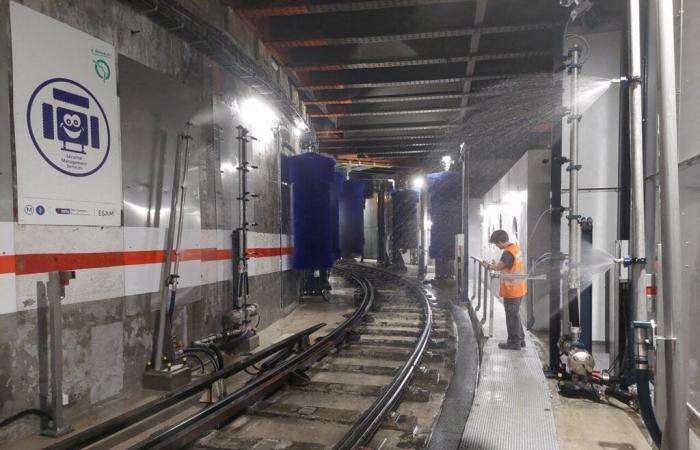
Par
Emilie Salabelle
Published on
Dec 3 2024 at 6:02 a.m.
See my news
Follow Paris News
To avoid any risk of flooding, RATP collects an average of 9.75 million cubic meters each year.3 of water, or 3,900 Olympic swimming pools 2 m deep. This substantial volume could constitute a valuable resourceat a time when episodes of drought are increasing and water resources are threatened. In a study published in November 2024 in collaboration with the RATP, the Atelier Parisien d'urbanisme (Apur) looked at their future potential.
A resource that goes down the drain
Generally evacuated from underground environments by pumping, these volumes which we call “exhaust water” mainly come from the stormwater runoffrising water tables or even infiltration due to road works. The RATP exfiltrates them to allow the operation of metros, tunnels and even underground car parks.
Currently, the vast majority of pumped water is discharged into the sewer networks (6.7 million m3/year), and to a lesser extent in a natural environment (2.2 million m3/year, or 22% of total rejected volumes), via “exhaustion stations” (PEP) located in Paris and the inner suburbs. By geolocating these PEPs, Apur has identified all the valorization possibilities.
For the moment, the reuse of this water remains embryonic and experimentalsince only 881,000 m3 of water per year are revalued. They make it possible to power the washing machine of the metro trains at the Javel workshop, water the tram platform at La Villette, or join the non-potable water network of the city of Paris at Balard…
Feeding natural waterways
Apur estimates that discharge into natural environments could be amplified by connecting new PEPs to the Seine or the Parisian canals. These discharges have the advantage of “contributing to the supply of watercourses”, or even limiting excessive decline, develops Apur. The Noisy-le-Grand PEP, for example, supplies the Mont d'Est lake, located near the RER station.
Several physical constraints currently limit release into natural environments. Most PEPs are connected to a “unitary” network, which mixes rainwater and wastewater. “But certain sectors are in a separative network and storm overflows could possibly be mobilized,” specifies Apur.
Water reused in cities
The RATP's drainage water reserves could also be used by reinjection into the Paris non-potable water network. An “ecological and economical” solution, since these volumes could be used forwatering, cleaning, feeding fountains and water features green spaces and sports fields. “For all these areas, access to a permanent water resource of sufficient quality offers the assurance of the preservation of plant heritage and healthy soil,” develops Apur.
A first experiment launched in 2019 at Balard station made it possible to save nearly 383,000 m in three years3. This system could find many other uses in the Paris region, such as on line 13 in Gennevilliers, where two PEPs could irrigate parks, gardens, and the edges of the A86 motorway.
“The city of tomorrow will need water”
RATP mine water could also prove very useful to sewer cleaningby supplying the flushing tanks, these tanks which clean the pipes by suddenly releasing a large quantity of water.
Increasingly connected to the non-potable water network, social landlords could use this resource for their residences: “watering of planted areas, washing of common areas and service areas, supply of toilets, calorie recovery…”, lists Apur.
So many uses which open up perspectives in terms of adaptation to climate change, defends the study: “The city of tomorrow will need water for its soils, its plantations, its hygiene, its beauty. The use of this resource remains to be understood in a global economy specific to metropolitan situations. »
Follow all the news from your favorite cities and media by subscribing to Mon Actu.





